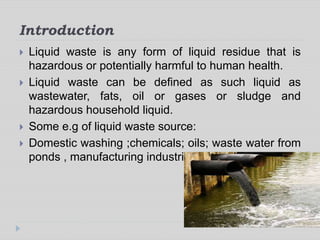The Definitive Guide to Reclaim Waste
The Definitive Guide to Reclaim Waste
Blog Article
The 8-Minute Rule for Reclaim Waste
Table of ContentsReclaim Waste for DummiesAn Unbiased View of Reclaim WasteThe Greatest Guide To Reclaim WasteFacts About Reclaim Waste RevealedThe Reclaim Waste Statements
Discover the types, events, and types of liquid waste. Domestic sewage waste describes the waste and products from a property septic system. This type of waste is produced by human beings in residences, institutions, and other structures. This only consists of sewage-disposal tanks that have a drainpipe area. The proper management and disposal of domestic sewage waste call for liquid waste to be transferred to a sewer therapy plant where the correct approaches and devices are put on detoxify and get rid of waste.
Commercial waste frequently consists of possible threats, such as flammable products or a mixture of fluid and solid waste products, and requires an advanced and thorough disposal procedure. The disposal of commercial waste usually involves the purification of waste before transportation to make certain risk-free and correct disposal. Industrial waste is developed from results and overflow of industrial processes and manufacturing.
This sort of waste can not utilize the very same sewer management transportation or processes as septic or business liquids. The industrial waste management process requires the inspection and testing of liquid waste before it goes through the disposal process (industrial wastewater treatment). Overflow waste is the fluid waste that comes from drainage and excess stormwater in very populated locations or cities
Runoff waste can trigger contamination and flooding if not taken care of correctly. Discover more concerning drain cleansing and waste management. Making sure appropriate waste monitoring can protect against calamities and decrease environmental damage. Both people in household settings and professionals in commercial or production sectors can gain from understanding the processes and guidelines of liquid waste monitoring.
An Unbiased View of Reclaim Waste
Call PROS Services today to discover our waste administration and disposal services and the appropriate methods to care for the fluid waste you generate.
(https://reclaimwaste1.edublogs.org/2024/11/12/efficient-liquid-waste-removal-and-disposal-your-complete-guide-to-sustainable-waste-management/)Do you recognize what takes place to your water when you end, purge the bathroom or drain pipes the washing maker? No? Well, it's worth understanding. This so-called 'wastewater' is not only a crucial resource however, after treatment, will certainly be released to our land, waterways or the ocean. Utilized water from commodes, showers, bathrooms, kitchen sinks, laundries and industrial procedures is understood as wastewater.

water made use of to cool down machinery or tidy plant and devices). Stormwater, a type of wastewater, is overflow that streams from farming and urban areas such as roofings, parks, yards, roads, courses and seamless gutters right into stormwater drains, after rain. Stormwater flows untreated directly to neighborhood creeks or rivers, at some point getting to the ocean.
The smart Trick of Reclaim Waste That Nobody is Talking About
In Queensland, a lot of wastewater is dealt with at sewer therapy plants. Wastewater is moved from residential or commercial sites with a system of drains and pump terminals, referred to as sewage reticulation, to a sewage therapy plant. Local federal governments build, keep and run most sewage treatment plants. Operators are certified under the Environmental Protection Act 1994 to release treated wastewater at an appropriate ecological requirement into rivers.
The Department of Natural Resources suggests city governments regarding managing, operating and keeping sewage systems and therapy plants. In unsewered locations, city governments might need householders to mount individual or household sewage therapy systems to treat residential wastewater from toilets, kitchens, shower rooms and laundries. The Division of Natural Resources authorizes making read the article use of household systems when they are shown to be reliable.
A lot of stormwater gets no treatment. In some new neighborhoods, therapy of some stormwater to remove clutter, sand and gravel has actually begun utilizing gross toxin catches. Wastewater treatment takes place in four phases: Removes solid matter. Bigger solids, such as plastics and various other objects wrongly discharged to drains, are removed when wastewater is gone through screens.
Wastewater then moves into large tanks where solids clear up and are eliminated as sludge. Grease and scum are skimmed from the surface area. Utilizes tiny living organisms referred to as micro-organisms to damage down and eliminate remaining dissolved wastes and great bits. Micro-organisms and wastes are incorporated in the sludge. Gets rid of nitrogen and phosphorus nutrients that could create algal flowers in our rivers and intimidate marine life.
The Reclaim Waste Diaries
Nutrient elimination is not offered at all sewer treatment plants since it needs expensive specialist tools. Clear fluid effluent created after therapy may still include disease-causing micro-organisms - industrial wastewater treatment.

This normally means wastewater needs to be treated or impurities eliminated prior to it can be discharged to waterways. The majority of wastewater streams right into the sewerage system. Under the Act, regional federal governments provide authorizations and licences for ecologically pertinent tasks (ERAs) entailing wastewater releases that might have a neighborhood effect. The department provides authorizations and permits to Ages including wastewater releases that may have a local or statewide impact.
Little Known Facts About Reclaim Waste.
Monitoring supplies valid info regarding water quality and can confirm that licence problems are being fulfilled. The details gotten with monitoring supplies the basis for making water quality decisions.
Report this page